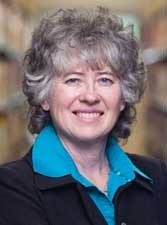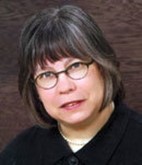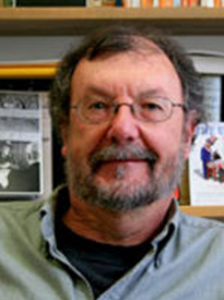Dr. Kristina Bidwell
Canada Research Chair in Indigenous Storytelling

In her work as Tier 2 Canada Research Chair in Indigenous Storytelling, Dr. Bidwell focuses on how the study of storytelling can help us to better understand and improve the relationships of Indigenous peoples to one another and to settlers. Challenging the perceived division between Indigenous storytelling and Indigenous politics, she studies Indigenous and settler storytelling in order to better understand the central role of stories in political contexts in Canada. She considers storytelling to include not only formal oral narratives and literary texts, but also the personal, communal, popular, and public narratives that we all tell and consume every day, and she assumes that stories not only mean things but also do things, shaping how we think, feel, and act.
Dr. Bidwell is a member of NunatuKavut, the southern Inuit community of Labrador. She earned a PhD from the University of Toronto, and she joined the Department of English in 2001. From 2011 to 2018, she was the first Associate Dean of Aboriginal Affairs in the College of Arts and Science at the University of Saskatchewan. She is the current President of the Indigenous Literary Studies Association.
Her work suggests that many political conflicts emerge from difficulties in understanding, valuing, and making space for one another’s stories, including conflicts over the ownership and use of land, of Indigenous identity, and of knowledge. Dr. Bidwell’s research addresses such conflicts by investigating how stories create meaning, circulate, and influence actions within inter-cultural collaborations and conflicts. On the basis of these investigations, her research program will offer principles and practical tools to improve inter-Indigenous and Indigenous-settler collaborations across many domains. During her first term as CRC, she will focus her research on three areas of conflict: over land in the Northwest Territories, over identity in Labrador, and around scholarly and artistic collaborations.
As part of her program of research, along with her collaborator Sophie McCall of Simon Fraser University, she hosted a workshop in Saskatoon which brought together a group of scholars, artists, and Elders from across the country who have a wealth of experience and knowledge in the art and politics of Indigenous collaboration. The goal of the workshop was to generate a co-authored list of best practices in such collaboration. This collectively generated list will form the conclusion to a book project on Indigenous-led collaboration.
For more insight's into Dr. Bidwell's research, please see this SSHRC news story.
Dr. Wendy Roy
Bateman Professor of English

During the term of the Bateman research professorship, Dr. Wendy Roy will complete work on a SSHRC-funded project, “Women of the Apocalypse: Writing the End of the World in Canada.”
Dr. Roy researches the ways that dystopian and apocalyptic fiction, film, and television by Canadian women writers comment on the present and past. She argues that such works ask readers to consider the impact that traumatic events, developments, and policies in the world today might have on the future.
The project to date has involved presentation of research on women’s apocalyptic and dystopian writing in Canada through conference papers, journal and book articles, graduate classes, Literature Matters panels, and keynote addresses. She also sponsored and co-organized the 20/21Vision: Speculating in Literature and Film in Canada conference, which gave her an opportunity to work with and mentor graduate students. As Bateman Professor, Dr. Roy has edited a collection of essays and creative works titled ReVisions: Speculating in Literature and Film in Canada; it will be published by University of Toronto Press in fall 2025.
Dr. Roy is a Canadian Literature specialist who joined the department in 2004 with a PhD from McGill University. She is the author of two books, The Next Instalment: Serials, Sequels, and Adaptations of Nellie L. McClung, L.M. Montgomery, and Mazo de la Roche (2019) and Maps of Difference: Canada, Women, and Travel (2005), and she is co-editor (with Susan Gingell) of Listening Up, Writing Down, and Looking Beyond: Interfaces of the Oral, Written, and Visual (2012). She has published essays on a number of Canadian writers including Emily St. John Mandel, Carol Shields, P. K. Page, Margaret Atwood, and Margaret Laurence. She is a member of the advisory board of Studies in Canadian Literature / Etudes en littérature canadienne and is past-president of the Association for Canadian and Quebec Literatures / l'Association des littératures canadiennes et québecoise.
The Bateman Professorship is open to full professors in the Department of English who have an established reputation in their field. The professorship was created in 1919 and is named in honour of Reginald Bateman, who became a professor of English at the University of Saskatchewan in 1909 and was killed during the First World War in 1918.
Dr. Lisa Vargo
University of Saskatchewan Distinguished Professor Emerita

Dr. Lisa Vargo was named University of Saskatchewan Distinguished Professor in 2021 to honour her exceptional achievement in research, scholarly, and artistic work.
The focus of Dr. Vargo’s research is on textual editing of Romantic literary works and on recovering and recognizing the work of British women writers of the late eighteenth and early nineteenth century. Over the years, that work has been supported by two SSHRC research grants. In 2018, Dr. Vargo was honoured with a Distinguished Scholar Award by the Keats-Shelley Association of America, recognizing “career-long excellence in scholarship devoted to the writers of our period and the culture in which they lived.”
During her career at the University of Saskatchewan, Dr. Vargo edited three scholarly editions, which brought back into print long-neglected works of literature primarily by women authors of the early nineteenth century and provided scholarly apparatuses including critical introductions, informative footnotes, and selected secondary readings. The editions include two lesser-known works by Mary Shelley, author of the well-known 1818 novel Frankenstein: the novel Lodore (1835), published by the Canadian scholarly publisher Broadview Press in 1997, and Spanish and Portuguese Lives (1837), published by Pickering and Chatto of London in 2002. In 2007, Dr. Vargo produced an edition of Thomas Love Peacock’s allusive and satirical 1818 novel Nightmare Abbey. She is currently co-editing two editions of Anna Letitia Barbauld’s writings and editing the 1831 version of Frankenstein, allowing readers to compare it to the 1818 edition.
Her extended research project on Mary Wollstonecraft Shelley examines the author as a woman of letters and includes ten published essays. As a form of public outreach for her research, in the fall of 2018 Dr. Vargo organized “Frankenreads at the U of S” to celebrate the 100th anniversary of the publication of Shelley’s 1818 novel. As well as the projects on Shelley and Barbauld, Dr. Vargo has researched and published on the writing histories of other female authors of the Romantic era, including Anna Jameson, Mary Robinson, and Mathilde Blind. Dr. Vargo has also been active in digital editing and publication; in 2000, with Professor Allison Muri who was then a graduate student, she created an edition of Anna Barbauld’s Poems of 1773, including a “poem web” that innovatively imagined how one might place a poem within a number of contexts.
Over the years, Dr. Vargo has served as an associate editor for the journal Women’s Writing. Her international work included serving as visiting scholar/professor at Durham University in England and the Jagellonian University in Krakow, Poland, and participating as an instructor in Summer Institutes at the Indian Institute of Technology Gandhinagar in Gujarat, India. She was also a participant and active collaborator with Dr. David Parkinson on the Project on International Collaborative Teaching. In recognition for her community outreach work, especially in the area of literacy, she was awarded a Saskatchewan Literacy Award of Merit in 1999, a Canada Post Literacy Award in the category of Educator in 2004, and a University of Saskatchewan Award for Distinction in Outreach and Engagement in 2007.
Dr. Len Findlay
University of Saskatchewan Distinguished Professor Emeritus

The late Dr. Len Findlay, who was named Distinguished Professor in 2012, did his early research and publication on Victorian aesthetic theory and practice. From this strongly interdisciplinary base, he then expanded his interests historically and philosophically, before turning to the social functions of the literary, the figure of the public intellectual, the role of institutions and disciplines in determining what counts as knowledge and culture, and the division of academic labor in the contemporary university.
Dr. Findlay’s reputation as a literary critic of nineteenth-century texts rests on a series of essays in leading journals such as Victorian Poetry, Studies in Romanticism, Romantic Praxis, Comparative Literature, English Studies in Canada, and University of Toronto Quarterly. In such venues, Dr. Findlay produced important new interpretations of canonical works. His persistent philosophical bent expressed itself for a time in serious study of the interface between phenomenology and literature, and this resulted in a series of wide-ranging and challenging essays that offered striking new interpretations of canonical works but also provided Findlay with the foundation on which to pursue his engagement with (primarily French) theories of signification, representation, and interpretation. His essays in this area, bringing together as they do immensely difficult theoretical texts with literary works of a comparable extent and complexity (like Browning’s The Ring and the Book), demonstrate in compelling ways how literature comes alive though new lenses but also how literature can both embody and challenge theoretical claims about language and meaning. Dr. Findlay’s work then took two new directions which could be broadly designated Marxist and Canadianist. His materialist critique of deconstruction was expressed in a series of essays in University of Toronto Quarterly, Textual Studies in Canada, and in collections such as Constructive Criticism: The Human Sciences in the Age of Theory.
Dr. Findlay’s contributions to Canadian studies derive in part from his leading roles in professional associations such as the Association of Canadian College and University Teachers of English (ACCUTE), the Humanities and Social Sciences Federation of Canada (HSSFC), and the Canadian Association of University Teachers (CAUT). He made the university a subject of inquiry as well as inquiry’s most eminent locus. A series of influential essays and book chapters, as well as an edited collection on Academic Freedom, argued rigorously for the responsibilities and opportunities that scholars must contend with, especially in the humanities in Canada. Another component of Dr. Findlay’s oeuvre is epitomized by his essay “Always Indigenize! The Radical Humanities in the Postcolonial Canadian University,” first published in Ariel in 2000. Dr. Findlay was an articulate, fearless, and compelling public speaker who gave keynote addresses across North America and in Europe, and was invited to speak in locations such as Harvard, the Sorbonne, Oxford, the University of Utrecht, and the Galleries of Justice in Nottingham, England.
As much at home in archival and historical work as in textual analysis, editing, or cultural and aesthetic theory, Dr. Findlay was a dedicated teacher-scholar, academic leader, and public intellectual. For more than a decade he used the Humanities Research Unit at the University of Saskatchewan as place for the encouragement of interdisciplinary work and as a means of connecting novice and established scholars to wider publics in the exploration and debate of subjects like racism, community, the socialized and medicalized body, and the Canadian response to 9/11. An award-winning teacher of undergraduates, he was also a mentor to scores of graduate students. His contributions to scholarship, to intellectual discourse, and to the values of the academy are immeasurable.

